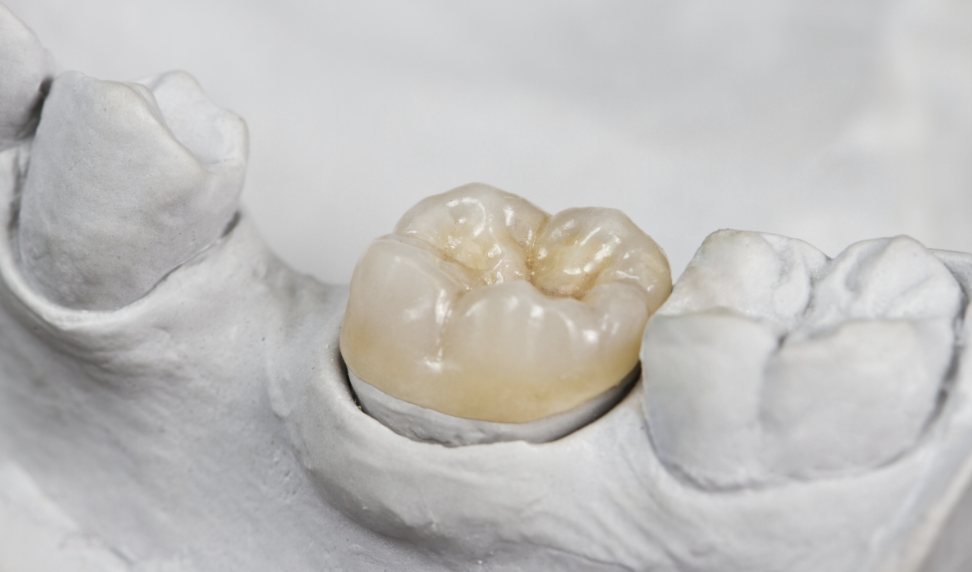Porcelain Dental Crowns
Tooth-colored porcelain crowns restore teeth without detracting from the appearance of your smile. These dental crowns enhance your smile while also providing optimal function and strength.
Whether you have a weak tooth that needs protection or want to replace an old metal restoration, all-porcelain crowns can be an effective, aesthetically pleasing option. To schedule an appointment with our cosmetic dentists in New York City, please call NYC Smile Design at 212-452-3344 or visit our website.
Who is a Ideal candidate for Porcelain Crowns?
Dental crowns are utilized when necessary to repair a damaged tooth. These restorations can be made of a variety of different materials, from metal alloy to all porcelain. Metal dental crowns have a long history in dentistry. However, they do not blend into the natural appearance of the smile so have fallen out of favor with the vast majority of patients. Porcelain crowns are an excellent treatment option for the person who wants not only an authentic-looking smile but also a restoration that does not involve placing metal in the mouth. These crowns are made to match the shade of surrounding teeth and to feel just like a natural tooth when chewing and when touched by the tongue.

Porcelain Crowns to Restore Damaged Teeth
Dental crowns protect and restore teeth. In this way, they prevent further tooth damage and maintain a healthy, pleasing smile. Specifically, a tooth crown may be used for the following:
- To protect a weak, damaged tooth
- To prevent a tooth from breaking apart
- To hold together a fractured tooth
- Restoring a tooth after a root canal
- As the replacement tooth atop a dental implant
- As the support for a replacement tooth in a dental bridge
Other dentistry restorations may also be an option, depending on the exact issue you are facing. Inlays, onlays and dental fillings are a few other restorations commonly used to treat damaged, decayed or weakened teeth. Our dentists are experienced in biomimetic dentistry techniques, which means they know how to restore teeth in a way that returns the tooth to an appearance, function and strength that mimics natural tooth properties.
What are the potential risks of getting a Porcelain Crown?
All dental procedures carry inherent risks. Though rare, a patient may have an allergic reaction to the numbing medication administered during treatment. Due to the absence of metal in porcelain crowns, the risk of allergic reaction to the crown itself is virtually zero. Additional risks of getting a dental crown include temporary nerve trauma. To fit a dental crown, the dentist must reduce the damaged tooth quite a bit. This is done with a dental instrument that vibrates against enamel. Vibrations are felt by the nerve and may lead to sensitivity and mild discomfort that can take several weeks to fully resolve. Dental crowns are widely revered as necessary and successful dental restorations. The risks of treatment are very low. With good care, the risks of damaging the final crown can be well-managed.
Porcelain Crowns vs. Other Types of Crowns
Dr. Tabib and Dr. Mello use only all-porcelain crowns at NYC Smile Design. Advantages of this type of dental crown include:
- Natural tooth color matched to your teeth
- Durable, strong porcelain material
- Secure bond formed between porcelain and enamel
Another common type of crown is made of porcelain fused to a metal base. While that type of crown is quite durable, it tends to cause the tooth to have a grey or silver tint. Also, a thin line of metal can become visible along your gum line, especially if your gums begin to recede. These problems are avoided when an all-porcelain crown is used.
Patient Testimonial
“This was my first visit to NYC Smile Design. Dr Mello was great! Good bedside manner, knowledgeable, professional and thorough. She explained everything she was doing as well as her evaluation of my case. Staff was wonderful too.”
How long do Porcelain Crowns last?
A dental crown can last an average of 15 years. Porcelain crowns may last anywhere from 5 years to more than 20. The longevity of the restoration is influenced by numerous factors. Patients who take excellent care of their teeth and gums should face lower chances of a crown failing. In addition to dental habits, chewing habits and lifestyle habits also contribute to the lifespan of a dental crown. Some tips for good dental crown maintenance include: Brush and floss daily as recommended by the dentist. Maintain regular dental checkups and cleanings every six months. If you clench or grind your teeth, have your dentist fabricate a custom-fit night guard to protect your teeth and gums. Do not bite or chew hard foods or objects.
Porcelain Crown Aftercare
After getting a dental crown, there are a few Do’s and Don’ts that patients should follow: DON’T chew until the anesthesia from treatment wears off and the mouth has full sensation. DO wait at least 30 minutes before biting down onto the newly-seated crown. This can prevent displacement. DO eat softer foods for a day or two while the nerve, tooth, and gums recover from treatment. DON’T eat crunchy, sticky, or hard foods for a few days after getting a crown. Ideally, the dental cement should be given several days to achieve a strong bond with the tooth. DO take care of the gums. After getting a crown, the gums may be somewhat irritated or tender. They can be encouraged to heal by rinsing the mouth with warm salty water. This can be repeated a few times a day to disinfect the mouth.

What are Porcelain Onlays?
Like porcelain crowns, porcelain onlays are made to resemble the natural tooth. Onlays are advantageous dental restorations that may be ideal for repairing the same injuries that dental crowns cover, but smaller. For example, a dental onlay may be recommended to restore strength to a tooth that has a minor fracture or chip on the chewing surface. This restoration could be referred to as a partial crown. It is made in a dental lab and is secured to the tooth with strong bonding material. With proper care, an onlay can last many years.
Contact Us
If you are interested in New York City and Manhattan porcelain crowns at NYC Smile Design, please call our helpful team at 212-452-3344 or visit our website. We serve NYC and all of the surrounding areas in New York.

